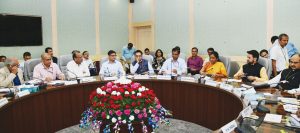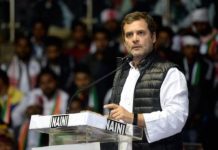 Finance Minister Nirmala Sitharaman, India’s first full-time woman finance minister, will present the full-year Budget for the financial year 2019-20 next month. The Union Budget will follow an interim Budget presented in February this year. In the February budget, the government had reduced taxes for the middle class and pledged an 75,000 crore assured income scheme for small farmers.
Finance Minister Nirmala Sitharaman, India’s first full-time woman finance minister, will present the full-year Budget for the financial year 2019-20 next month. The Union Budget will follow an interim Budget presented in February this year. In the February budget, the government had reduced taxes for the middle class and pledged an 75,000 crore assured income scheme for small farmers.
Among other key announcements, the government unveiled a direct cash support of 6,000 a year for small farmers in a scheme called the “Pradhan Mantri Kisan Samman Nidhi’’ at a cost of 75,000 crore. The scheme means cash handouts of 2,000 each in three installments to be transferred to the accounts of small and marginal farmers who have less than two acres land.
In the light of slowing economic growth, industry body Federation of Indian Chambers of Commerce & Industry (FICCI) said the new government should cut corporate and individual taxes and consider tax concessions for export-oriented manufacturers. “The upcoming Budget… is an opportunity for the government to boost consumption and investments through appropriate fiscal stimulus and policies,” FICCI said.
In her Opening Remarks, the Finance Minister, Nirmala Sitharaman said that the public investment in social infrastructure like education, health and other services is a key determinant of quality of life of the people. She said that the present Government is committed for improving the educational standards, skilling the youth, enhancing job opportunities, reducing disease burden, empowering women and improving human development in order to have an inclusive development.
The main areas of discussion during the aforesaid Meeting included issues relating to Health (Primary health & Tertiary services, Ayush &Ayurveda), Education (School & University education, Private & Public education), Social Protection (Old age, Women and Children, Dalits and Other Backward Classes & Youth), Pensions and Human Development among others.
This is what industry farm bodies and masses want from the Budget. The industry bodies like Confederation of Indian Industry (CII) want the corporate tax rate to be slashed from 30 per cent to 25 per cent, others like Federation of Indian Chambers of Commerce & Industry (FICCI) want the highest tax rate to be no more than 18 per cent.
For corporates, there are suggestions that the DDT be reduced from 20 per cent to 10 per cent. FICCI says, “All dividends on which DDT has been paid, be allowed to be reduced from dividends irrespective of the percentage of equity holding keeping in mind that investment companies which do not necessarily have subsidiaries as they invest in various companies in the open market, be also made eligible for such benefit.”
About the minimum exemption for income tax purposes, industry bodies want exemption limit be raised to 5 lakh from 3 lakh at present. FICCI has advocated more for high net worth individuals instead of the common man. They have demanded abolition of 10 per cent and 15 per cent surcharge imposed on incomes above 50 lakh and 1 crore respectively. But others like ASSOCHAM have articulated raising the exemption limit to 5 lakh.
Industry bodies have demanded that the government’s rule that prohibits cash transactions above 2 lakh should be modified to exclude Non-Banking Financial Companies (NBFCs) from its ambit. Others have articulated doing away with multiple regulators in the financial sector and instead have a single regulator for the entire financial services sector. Industry groups have asked for sweeping land reforms in India that allows for land aggregation and private sector investment in agriculture. Several states in India at the moment do not allow for land leasing. But the practice continues despite these bans across India. Stakeholders have called for a more unified approach for implementing land leasing reforms across all Indian states.
While India’s export industry hasn’t performed empathetically, there are suggestions to provide enhanced incentives to boost the export sector. All export incentives and export credit initiatives need to be made WTO compatible. FICCI points out that incentives provided by China to its exporters can go up to almost 17 per cent of the total value of exports. India too needs to provide similar benefits to boost its exports. While the common man has asked for higher interest rates for savings accounts representatives of financial sector have also made similar demands. In addition financial sector representatives have asked for review of banking NPAs provisions through setting-up a Committee, enhancing financial literacy programmes and funding, incentivising agricultural marketing, setting-up of Debt Exchange Traded Fund, domestic capability building in Audit & Credit Rating, making available trade licence online for MSME sector, provision to ease liquidity pressures created due to insolvency and rationalization of various taxes like Security Transaction Tax (STT) in capital market.
There has been serious distress in the farm sector. There have been demands to make farming viable by linking the minimum support price with the cost of inputs as suggested by MS Swaminathan report. Already there is a criticism of the government over the failure of the crop insurance scheme. Incentivising and popularising usage of organic manure for improving the carbon content in the soil, increasing investment in micro-irrigation and solar pumps, financial incentives to the states for implementing agricultural market reforms and promoting start-ups in agriculture are other demands.
Health care and education are other areas of concern. While many common citizens have asked for tax exemptions on healthcare for the elderly, industry bodies like FICCI have made some radical suggestions. These include raising tax exemption on preventive health check-ups from 5,000 to 20,000, raising medical reimbursement limit to 1 lakh from 15,000 and providing capital subsidy for investments in the healthcare including setting up dedicated funds for building more hospitals by providing easier access to capital for such expansion.
Similarly, in the education sector, some common-man demands include regulation of private school fees and other arbitrary fees imposed by higher educational institutions in the private sector. Industry groups like FICCI have demanded 10,000 crore per year allocation on making the smart device available to each student and teacher free of cost under Sarva Siksha Abhiyan, 5000 crore public spend over 3 years to set up National Science, Humanities, and Technology Research Foundation to fund research, tax breaks to corporates which nominate their employees for higher education either through the continuing education model or a full-time program and greater freedom for higher educational institutions to set up overseas campuses with a $500 million line of credit extended by EXIM bank for the same.
India’s first full-time woman finance minister will present the full-year Budget for the financial year 2019-20 next month. The Union Budget will follow an interim Budget presented in February this year and will be the first under the second National Democratic Alliance (NDA) government led by Prime Minister Narendra Modi. In the February budget, the government had reduced taxes for the middle class and pledged an 75,000 crore assured income scheme for small farmers.
 Among other key announcements, the government unveiled direct cash support of 6,000 a year for small farmers in a scheme called the “Pradhan Mantri Kisan Samman Nidhi’’ at a cost of 75,000 crore.
Among other key announcements, the government unveiled direct cash support of 6,000 a year for small farmers in a scheme called the “Pradhan Mantri Kisan Samman Nidhi’’ at a cost of 75,000 crore.
The scheme means cash handouts of 2,000 each in three installments to be transferred to the accounts of small and marginal farmers who have less than two acres land.
Industry body Federation of Indian Chambers of Commerce & Industry (FICCI) say the new government should cut corporate and individual taxes and consider tax concessions for export-oriented manufacturers. “The upcoming Budget… is an opportunity for the government to boost consumption and investments through appropriate fiscal stimulus and policies,” FICCI said. Ahead of the preparation of the full-year Budget, government officials have started consultations with industry bodies such as the FICCI and CII.
Nirmala Sitharaman’s maiden pre-budget meeting was attended by Subhash C. Garg, Finance Secretary, Girish Chandra Murmu, Expenditure Secretary, Ajay Bhushan Pandey, Revenue Secretary, Rejeev Kumar, Secretary, DFS, Rabindra Panwar, Secretary, Ministry of Women & Child Development, Balram Bhargava, Secretary, Department of Health Research, Preeti Sudan, Secretary, Department of Health & Family Welfare, Heeralal Samariya, Secretary, Ministry of Labour & Employment, Pramod Chandra Mody, Chairman, CBDT, P.K Das, Chairman, CBIC, Dr K.V. Subramanian, CEA and other senior officials of the Ministry of Finance.
The stakeholders of Social Sector gave a wide range of suggestions in the Meeting including focus on education and hygiene particularly for rural women, audit of cities to identify security gaps to strengthen women safety, increased budgetary allocation towards nutrition of infants and pregnant mothers, full operationalization of one-stop centres for women in all districts, expansion of healthcare infrastructure, provision of free drugs and diagnostic facilities, rationalisation of taxes on medical devices, promotion of Public-Private Partnership in Secondary and Tertiary Healthcare Sectors, creation of model schools on cluster-based approach with electronic and transport connectivity, increased allocation for post-matric scholarship schemes, recognising and encouraging contribution of teachers though instituting awards, investment in protection of children from labour, promoting focus on fruits and vegetables intake, higher taxation on sweetened and salted products, investment in hygiene behaviour, forming Rural Faecal Sludge Management Policy, promoting social entrepreneurship amongst young population, fiscal incentives for recycling of waste water and rainwater harvesting, declaring malnutrition free Panchayats on the line of Open-Defecation Free Panchayats, increased budgetary allocation for Special Schools and Rehabilitation Centres among others.
Stakeholders of Social Sector included Rekha Sharma, Chairperson, National Commission for Women, Asadullah, Programme Director, Centre for Budget and Governance Accountability, Arvind Lal, Chairman, Federation of Indian Chambers of Commerce and Industry, FICCI, Prabhat Jain, Founding Chairman, FICCI, Yasmin Ali, UNICEF representative in India, Vaidya Nathan. K., Finance Director, Indian School of Business; Yamini Aiyer, President, Centre for Policy Research; Beena, General Secretary, National Campaign on Dalit Human Rights; Jashodhara Dasgupta, Executive Director, National Foundation for India; Rohit Prasad, Chief Operating Officer, Helpage India, Amit Shovon Ray, Senior Adviser, Voluntary Health Association of India, Srikanth Vishwanathan, CEO Janaagraha Centre for Citizenship and Democracy and Priyanka Kanoongo, Chairperson, National Commission for Protection of Child Rights among others.
letters@tehelka.com













